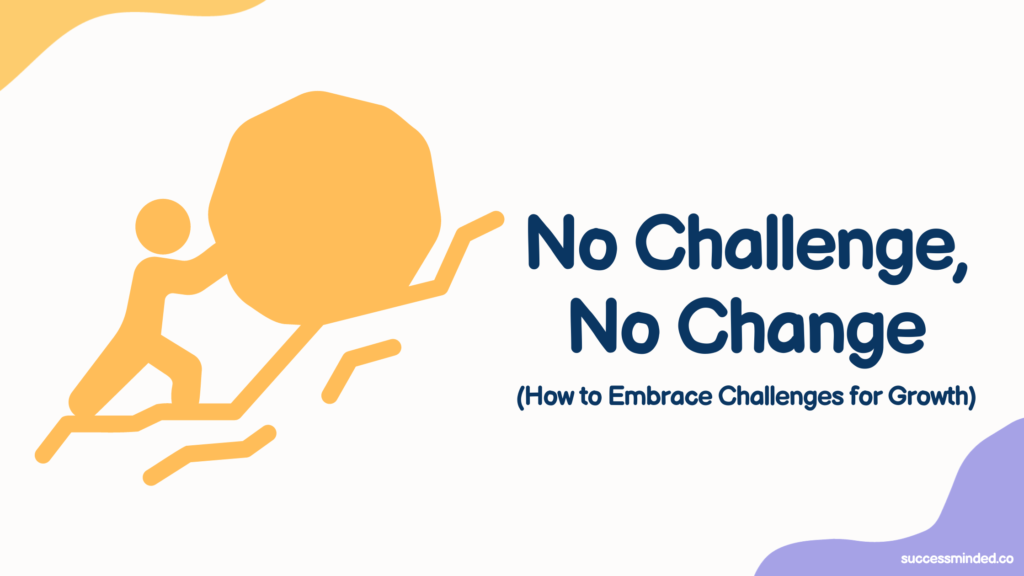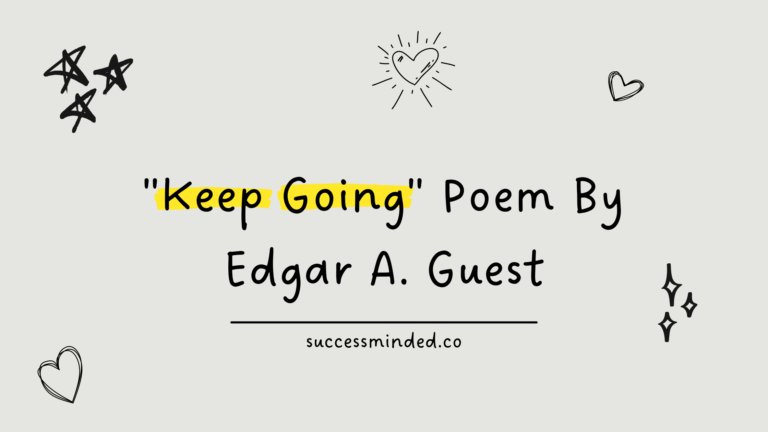We all have dreams and goals that exist way outside our comfort zones. Reaching them requires doing things we’ve never done before – and that can be scary. Our brains prefer the ease of the status quo over the discomfort of developing new skills. But as the saying goes, “No challenge, no change.”
Without facing challenges, we remain stuck and don’t experience personal growth.
Stepping outside routines and taking on challenges feels awkward, risky, and intimidating. But it’s a necessary part of positive change. Facing our fears is the only way to expand what’s possible in our lives. Walking this path develops confidence, resilience, skills, and a sense of achievement.
I want to offer some perspective on why challenges catalyze growth, how to reframe them as opportunities, and strategies to embrace challenges on the road to your biggest goals. So buckle up – it’s time to get uncomfortably comfortable!

No Challenge, No Change: Why We Need Discomfort to Grow
Our mental “muscles,” like courage, confidence, and problem-solving ability, need regular challenge workouts to increase their strength, just like our physical muscles. Experiencing new situations requiring different decisions and actions forces these mental capacities to adapt and improve.
Without varied challenges, these mental “muscles” atrophy from underuse like a casted arm. We fall back on familiar thought patterns and behaviors. While comfortable, this leaves great potential untapped.
Additionally, muscles need progressive resistance training to grow – attempting challenges at just the edge of our current limits, then increasing the degree of difficulty as capacities expand. The same applies to mental abilities.
Each challenge we undertake builds skills and knowledge to equip us for the next. It’s progressive growth. Continually raising the bar strengthens abilities far beyond what staying comfortable allows.
On top of developing capacities, challenges provide the needed motivation to focus energy on personal growth. Without the need to push ourselves, most people lose momentum on goals as day-to-day routine takes over. Aimless drifting replaces meaningful progress.
But stepping up to challenges keeps us moving forward out of stale comfort zones and onto new levels of achievement. No challenge, no change. Discomfort is the call to growth.
Reframing Challenges as Growth Opportunities
It’s natural to view a challenge as an ominous obstacle. But with this perception, we’ve already decided we’ll fail or be inadequate. It becomes a self-fulfilling prophecy.
Instead, reframe each challenge as an opportunity for self-improvement. Adopt a growth mindset focused on progress and enjoyment of the process itself, not perfect outcomes. Detach from expectations.
Ask yourself: What skills could this challenge help me develop if I stay open and positive? How will overcoming this make me wiser and stronger? How might I fail and learn something valuable for next time?
Remember, the real value lies in the learning process along the way. The outcome is secondary. You’ve succeeded if you’ve stretched yourself and gained experience.
Everyone faces setbacks on the road to growth. Expect mistakes and failure at times. Forgive yourself. Failure well-handled teaches powerful lessons for the next challenge.
Continue reframing each discomfort as a positive vehicle for self-expansion, and you’ll extract something of value both from successes and failures. The path itself brings growth.
Strategies to Step Up to Challenges

Stepping up to challenges gets easier when you use these strategies:
Push Your Limits Incrementally
Don’t go from zero challenges to overwhelming yourself. Make small, steady steps outside your comfort zone. Each time you try something new and challenging, you expand your limits a little at a time. Build confidence through progressively greater challenges while allowing proper rest, too.
Focus on Process, Not Perfection
With any new skill, focus on the enjoyment of the learning process rather than being perfect right away. Don’t get hung up on being an expert immediately. Detaching from expectations helps accelerate progress.
Ask For Help When Needed
You don’t have to tackle every challenge alone. Asking experienced mentors or coaches for guidance shows strength, not weakness. Find wisdom to support you through unfamiliar territory.
Use Positive Self-Talk
When challenges drag you down, replace limiting thoughts with encouraging self-talk. Celebrate little wins. Remind yourself, “I’ve got this!” A solutions-focused mindset fuels motivation.
Keep Eyes on the Horizon
Connect to your big-picture vision when challenges overwhelm you. How does overcoming this prepare you for future goals? Keep perspective on the higher purpose at hand.
Conclusion
No quick fix can substitute for the growth that comes from facing challenges head-on. Be compassionate with yourself through the uncomfortable process. Trust that your abilities are expanding, even if it doesn’t feel that way in the moment.
Remember: no challenge, no change. Keep taking courageous steps forward, and watch yourself grow.




Pingback: True Joy in Life: Living with Purpose and Passion – Success Minded
Pingback: "Excuses Are Tools of Incompetence" Poem – Success Minded
Pingback: Lessons from "Never Give Up" Poem by Martin Farquhar Tupper – Success Minded
Pingback: 8 Habits to Live for Yourself: Cultivating a Life of Authenticity and Joy – Success Minded
Pingback: 10 Ways How You Can Be Stronger Than Your Excuses – Success Minded
Pingback: The Top 25 Most Iconic Master Shifu Quotes – Success Minded
Pingback: A Short Guide For Creating a Mindset of Execution Over Excuses – Success Minded
Pingback: "Wherever you are - Be all there." ~ Jim Elliot – Success Minded
Pingback: The Essence of Belonging: Home is Not a Place, It's a Feeling – Success Minded